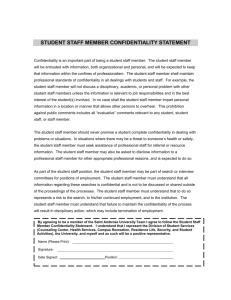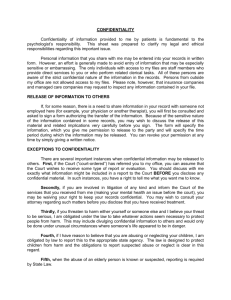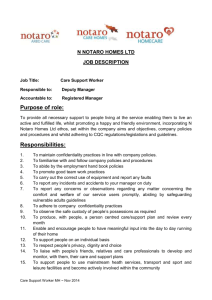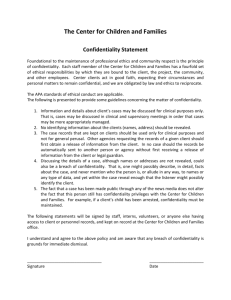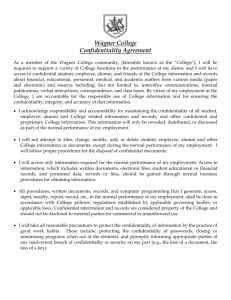Confidentiality and the Staff Team
advertisement
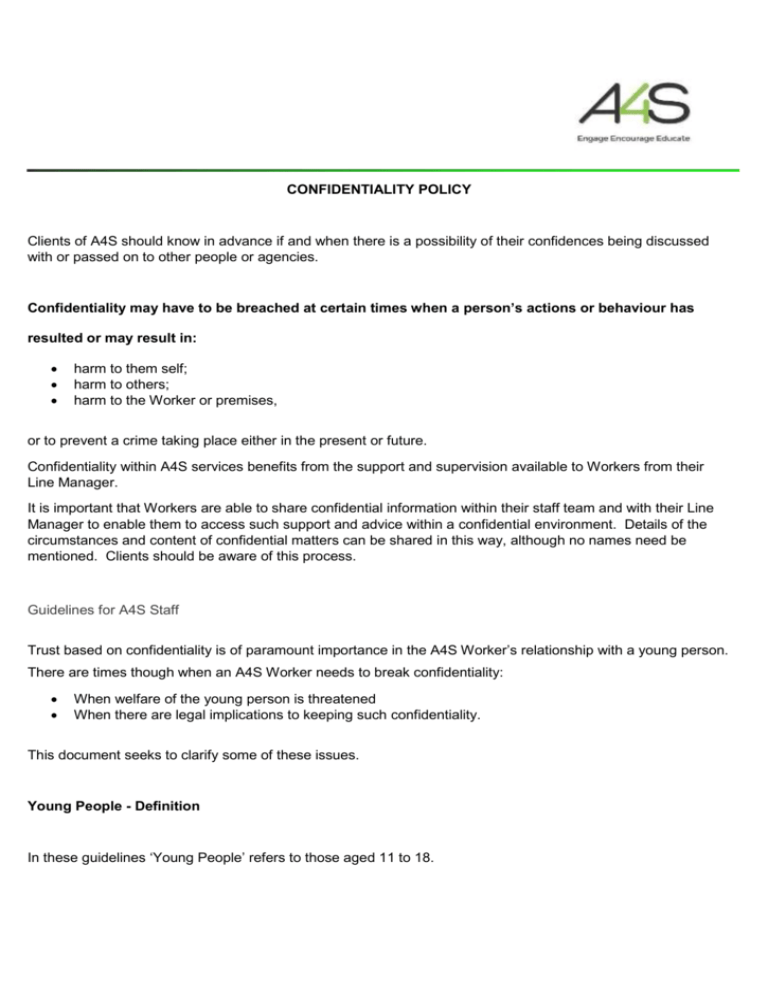
CONFIDENTIALITY POLICY Clients of A4S should know in advance if and when there is a possibility of their confidences being discussed with or passed on to other people or agencies. Confidentiality may have to be breached at certain times when a person’s actions or behaviour has resulted or may result in: harm to them self; harm to others; harm to the Worker or premises, or to prevent a crime taking place either in the present or future. Confidentiality within A4S services benefits from the support and supervision available to Workers from their Line Manager. It is important that Workers are able to share confidential information within their staff team and with their Line Manager to enable them to access such support and advice within a confidential environment. Details of the circumstances and content of confidential matters can be shared in this way, although no names need be mentioned. Clients should be aware of this process. Guidelines for A4S Staff Trust based on confidentiality is of paramount importance in the A4S Worker’s relationship with a young person. There are times though when an A4S Worker needs to break confidentiality: When welfare of the young person is threatened When there are legal implications to keeping such confidentiality. This document seeks to clarify some of these issues. Young People - Definition In these guidelines ‘Young People’ refers to those aged 11 to 18. In all matters of confidentiality the young person’s age and their understanding needs to be taken into account. As a general rule the younger the young person, the greater the need to involve parents/other agencies if their safety or welfare is threatened. If in doubt contact your Line Manager for advice. In all our work the safety and welfare of the young person is of paramount importance. There are times when a young person will disclose information to an A4S Worker which the Worker believes puts the safety/welfare of that young person at risk. If this happens the Worker should tell the young person of their concerns and that the information cannot be kept confidential. Examples of when confidentiality may be breached: When a young person discloses abuse either to them self or to another young person or people; When a person’s actions or behaviour has resulted or may result in: o o o harm to them self; harm to others; harm to the Worker or premises, or to prevent a crime taking place either now or in the future. This list is not complete and there may be other instances when the A4S Worker feels they need to breach confidentiality. Breaching Confidentiality How to inform the Young Person: “Before we go any further, I need to inform you of my position as a mentor/employee of A4S. Whilst our discussions are confidential (between you and me) there may come a time where I feel that you are at risk, in danger, or in breach of the law. If this time comes I may not be able to keep this information to myself, I may have to tell someone else whether you want me to or not. However, you have my word that if that time comes I will tell you first.” The young person should be informed when confidentiality cannot be kept and all young people should be aware of your responsibilities and duties as an employee of A4S. Confidentiality Policy August 2015 Confidentiality and Abuse Staff should refer to the Safeguarding Children (Child protection) Policy in relation to issues of confidentiality and claims/concerns regarding abuse. Confidentiality and the Law In the following situations, Workers should contact the local Police immediately and report to their Line Manager preferably within 12 hours (same working day). Where violence occurs that is a threat to the health of young people or staff: There is no general legal duty to report an offence to the Police nor to give information about an offence if questioned by Police. However giving false or misleading information can lead to a prosecution for obstruction. A Worker cannot be prosecuted for refusing to co-operate in a Police investigation. Prosecution could arise, however, if a Worker refuses to assist an Officer who is dealing with a situation, which involves a breach of the peace. Where adults over the age of 18 are involved in the supply of illegal substances on youth work premises: For an action to amount to wilful obstruction it must be deliberate, intentional and positive, e.g. giving Police false or misleading information with the intention of protecting a young person from a Police investigation. Refusing to answer questions about a young person in connection with an offence does not constitute an obstruction. Telling a young person not to commit an offence does not constitute an obstruction; but advising a young person not to go ahead with an illegal act because of Police investigations, knowing that the young person will only postpone the crime, could result in prosecution. Contact with Parents When working with young people aged between 11 and 18 it is advisable to involve parents in any decisions concerning the welfare of young people. However, it is sometimes the case that the Worker judges the family relationships to be such that parental involvement may further jeopardise the welfare of the young person. In such a case the Worker should consult with the Line Manager prior to any further action unless there is an emergency. Prior to contacting parents, ‘in all cases’ the Worker should first consult with the young person, hoping that it will be done on his or her terms and in the least compromising manner. When informing parents the Worker needs to assess how they will respond given the circumstances and incident/s. Parents may need help to explore and come to terms with issues facing a young person. Confidentiality Policy August 2015 Always discuss these issues with your Line Manager and inform them of your actions. Confidentiality and the Staff Team A4S Workers benefit from the support and supervision available in the wider A4S staff team and from their Line Manager. It is important that Workers are able to share confidential information within their teams and with their Line Manager to enable them to access such support in a confidential environment. Details of the process and the content of confidential matters can be shared in this way, although no names need be mentioned. Always make young people aware of this. Role of Managers A Manager’s role is to support and advise Workers and to offer supervision when necessary. Always discuss an issue with your Line Manager before contacting parents or other agencies except in emergencies. Any support or supervision you receive from your Line Manager will be in confidence unless otherwise stated. Line Managers/Supervisors should offer positive support and guidance to Workers as needed. Confidentiality and the Media Do not respond to media pressure to make comments. Direct any media enquiries to a member of the A4S Management Team. Contact your Line Manager before making any comments or statements. Empowering Clients Finally, one of the main aims of youth work is to enable young people to gain autonomy and self-direction. As far as possible the Worker should aim to empower young people rather than restrict them. These aims should be borne in mind in any matter concerning confidentiality and the welfare of young people. Brian Burke – A4S Chair of Trustees .........................................................................................……. Reviewed: August 2015 Next review: August 2016 www.a4sbedford.com Part of ProgressAbility.org 01234 272101 ProgressAbility.org is a Charitable Company Limited by Guarantee. Registered Office: 129A Barker’s Lane, Bedford, Bedfordshire, MK419RX Registered Charity #: 1142732 Company Registration # in England: 07678748 Confidentiality Policy August 2015 Confidentiality Policy August 2015 Confidentiality Policy August 2015



